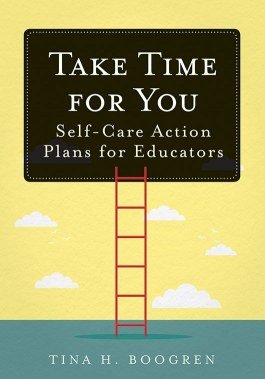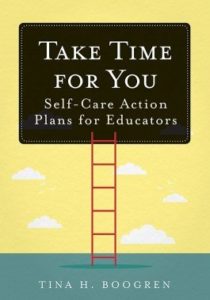

Boogren first encourages those on a self-care journey to understand their needs and reflect about how they spend their time. The first rung on her self-care ladder involves attending to one’s basic physiological needs for water, food, exercise, rest, and shelter. She suggests that people can better attend to their physiological needs by, for example, drinking more water, planning healthy meals, scheduling exercise, removing electronics from the bedroom, and washing hands frequently.
The second need to be satisfied relates to being and feeling safe. Predictability, fairness, and preparation all contribute to feelings of safety. To increase safety and feelings of safety one can keep a schedule, write about feelings, learn and practice emergency safety procedure, and regularly schedule medical appointments. Additionally, people need to feel as though they belong to a group or community. Boogren urges readers to intentionally build relationships with colleagues and focus on being present when spending time with loved ones. Finally, people have esteem related needs. We all want to feel appreciate and recognized. Those with healthy self-esteem believe in themselves, know what they want in life, accept compliments gracefully, communicate well with others and can learn from their mistakes. They do not gossip excessively, compare themselves to others, brag, or take large and impulsive risks. To build esteem one can reframe self-relevant thoughts to be more positive, set realistic expectations, and recite self-affirmations, especially during stressful times.
While needs related to bodily comfort, safety, belong, and esteem all stem from avoiding negative experiences, the final two needs that Boogren discusses—self-actualization and transcendence—pertain to a desire for opportunities for personal growth, realizing one’s potential, and connecting to communities and ideals beyond the self. Am I living my best life? Reflecting on this question, according to Boogren, can help one achieve self-actualization. The self-actualized individual can accept uncertainty and emotional complexity, feel appreciation, and demonstrate creativity. Choosing work that one loves, removing distractions, and training focus can help people experience immersive flow states in which they are completely focused on and happily pursuing a clear goal. When one has sufficiently satisfied each of the preceding needs, one can engage in the transformational experience of transcendence, or connecting to a higher purpose. Although transcendent experiences are hard to achieve, Boogren suggests that feeling inspired by books, movies, or music, cultivating feelings of gratitude (e.g., through writing thank you notes), meditating, volunteering, donating, and being kind and compassionate can all help.
This guide to developing a personalized self-care plan can help prevent burn-out and help individuals feel good. Self-care aids educators and other professionals in bringing themselves fully to their work and relationships and realizing their potential.
Boogren, T. H. (2018). Take Time for You: Self-Care Action Plans for Educators. Bloomington, IN: Solution Tree Press.




